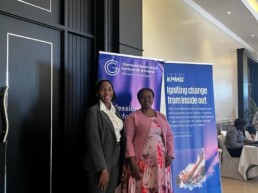In the News

Kenya
Kenya is Africa’s start-up funding top destination
Kenya has become the top destination for start-up funding in Africa, surpassing Nigeria and Egypt. This is despite a decrease in funding opportunities for emerging companies globally.
In 2023, 62 Kenyan start-ups raised approximately $673.78 million from both local and international investors, which is a 17% increase from the $574.8 million raised in 2022. This achievement is in contrast to the decline in funding observed across the rest of the continent, as reported by the start-up research organization, Disrupt Africa. Nigeria and Egypt, which were previously dominant in African start-up funding, experienced a decrease in 2023 due to global economic challenges impacting investment trends worldwide.
In Kenya, the majority of the funding in 2023 was allocated to energy start-ups, particularly benefiting off-grid solar pay-as-you-go companies like M-Kopa and Sun King, which collectively raised $465 million. This accounted for 69% of the total start-up funding received in the country.
Source: The East African
Kenya and Tanzania partner to fight counterfeits
The East African region, led by Kenya and Tanzania, is making strides towards establishing a common standard for goods across the bloc, as part of the ongoing fight against counterfeiting. This initiative comes after a previous endeavour with the 2011 Anti-Counterfeiting Bill collapsed at the East African Legislative Assembly, resulting in the region operating under the East African Customs Act on Anti-counterfeit regulations.
Nevertheless, Kenya and Tanzania have reignited efforts to reintroduce the 2011 legislation. The Anti-Counterfeit Authority (ACA) of Kenya and the Fair Competition Commission (FCC) of Tanzania have announced collaborative measures to enhance their efforts in disrupting and combating the trade in counterfeit goods across the region.
This partnership includes regulatory adjustments aimed at harmonizing conflicting areas in the current laws of both countries. Robi Mbugua Njoroge, Executive Director of the Anti-Counterfeit Authority, expressed that this renewed collaboration provides opportunities for law enforcement agencies to devise innovative approaches and strategies in combating counterfeit trade.
Source: The Exchange
Tanzania
UK Injects $7.7 Million to Boost Zambia-Tanzania Trade Route Upgrade
The Government of Zambia and TradeMark Africa (TMA) have forged a Partner Support Agreement (PSA) aimed at enhancing the Nakonde One Stop Border Post, which serves as a critical trade route between Zambia and Tanzania. This project, funded by the UK government to the tune of $7.7 million (ZMK 197 million), is poised to facilitate the movement of goods and people along the Dar es Salaam Corridor, with a commitment to streamline operations and slash cargo clearance times by over 100 per cent on both sides of the border.
Under this initiative, the Nakonde Border Post will undergo various enhancements, including the upgrading of road infrastructure within the OSBP and the truck parking yard, the construction of additional office buildings and warehouses, and the installation of a modern cargo scanner. Additionally, the project entails the digitization of clearance processes and the implementation of smart gates, all geared towards reducing dwelling times for cargo trucks, which currently stand at an average of 55 hours.
Source: The Exchange
Tanzania eyes single African air transport market
Tanzania has revealed intentions to become a part of the Single African Air Transport Market (SAATM), which would provide significant opportunities for the country’s air transportation industry to boost its revenue streams.
Mr Hamza Johari, the Director General of the Tanzania Civil Aviation Authority (TCAA), announced during an awareness workshop in Dar es Salaam that discussions are ongoing among various stakeholders to explore potential opportunities and establish appropriate regulations before committing to join
The workshop aimed to address two primary issues: the feasibility of Tanzania’s participation in the single air transport market and the formulation and enforcement of new aviation regulations. This move would enable Tanzania’s airlines to operate freely across the African continent for both passenger and cargo transportation.
Source: Daily News
Uganda
Foreign Direct Investments (FDI) remain stable due to oil-related investments.
The Bank of Uganda has reported that Foreign Direct Investments (FDI) amounted to $2.9 billion in the twelve months leading up to January 2024, a figure nearly identical to that of the corresponding period in 2023. The bank attributes the stability to investments in the oil sector, although it suggests that these may have reached their peak, explaining the lack of change.
FDI continues to play a crucial role in restoring investment confidence in Uganda, which experienced a significant downturn in 2020 due to the impact of the COVID-19 pandemic.
Source: The Monitor
Uganda moves to fulfil EU coffee export conditions
Uganda, represented by the Uganda Coffee Development Authority (UCDA), has announced the implementation of measures aimed at ensuring that coffee supply chains are free from products that contribute to deforestation, in anticipation of the January 1, 2025 deadline.
Under the Deforestation Regulation enforced by the EU, only goods deemed legal in their country of origin and not associated with deforestation or forest degradation will be allowed in the markets of EU member countries.
During a stakeholders meeting, Dr Emmanuel Iyamulemye, the Managing Director of UCDA, stated that Uganda is actively working towards compliance with these regulations. UCDA is engaging with various stakeholders to determine the best course of action moving forward.
Source: The Monitor
Rwanda
Rwanda set for new $165 million IMF funding
The International Monetary Fund has approved an additional $165.5 million in funding for Rwanda following a two-week mission to the country. Under the newly allocated funding, Rwanda will receive approximately $76.6 million through the Resilience and Sustainability Facility (RSF) and $88.9 million through the Standby Credit Facility (SCF).
However, the IMF also expressed concerns about potential risks that could negatively affect Rwanda’s economy. These risks include increased geopolitical fragmentation, potential spikes in global energy and food prices, and a slowdown in the growth of trading partners. Ruben Atoyan, the IMF mission lead, warned that Rwanda needs to be cautious of these risks despite its positive economic outlook.
Source: The New Times
Rwanda’s inaugural Green Bond signals market development
Prime Energy, a local hydropower company, has announced the issuance of Rwanda’s first-ever Green Bond valued at Rwf9.5 billion following the approval from the Capital Market Authority (CMA).
According to experts in the capital markets sector, the issuance of Rwanda’s first Green Bond demonstrates the rapid growth of the market and is well-timed due to the growing interest of investors towards similar financial instruments.
The bond, with a tenure of 7 years, will be available to the public from March 18 to April 5, after which it will be listed and traded on the Rwanda Stock Exchange starting April 26, as per an official statement.
Supported by the International Finance Corporation (IFC), the proceeds from this specific bond are earmarked for investment in a new renewable energy project and for the maintenance of the country’s existing four hydropower plants.
Source: The New Times











